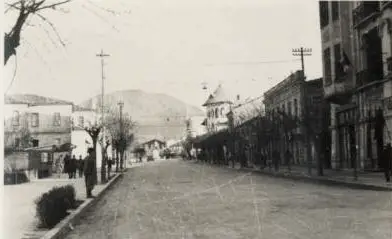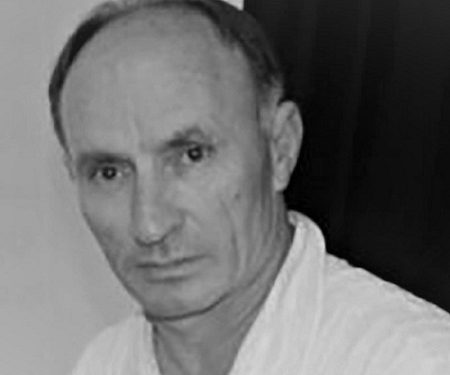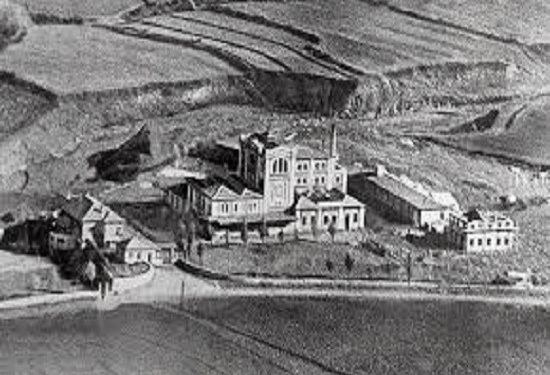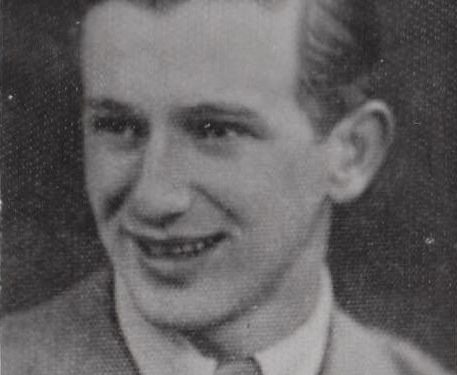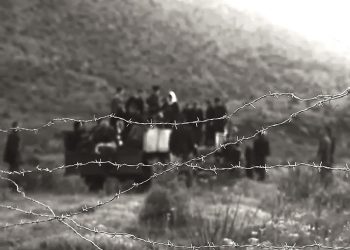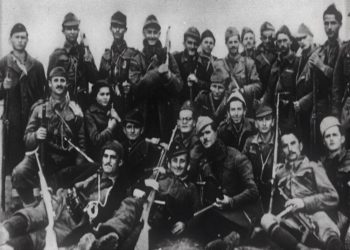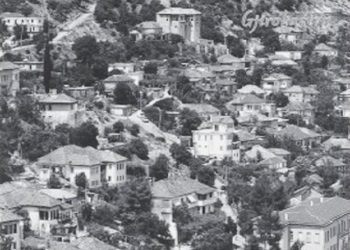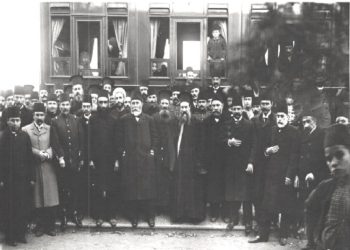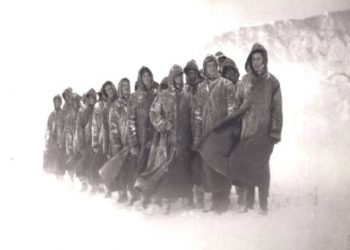From Xhvehir Gradica
Memorie.al / On the “Four Roads” of Shijak, somewhere around 100 m. on the right of the Durrës-Shijak segment, after a small bend in the road, lives a woman who has as much suffering as her 70-year-old age. Her name is Fatrije Qyteza, the daughter of the patriot killed in the communist prisons, Ali Maliqi from Dibra, married to the son of the Korça merchant Qamil Qyteza. While his hands tremble from suffering, age or emotions caused by having to recall those years of suffering, his eyes speak volumes. She also has a strong voice, as she testifies that she is the daughter of a tribal fireman and the wife of a well-known doorman. Until the 90s, the husbands and sons of the house were sent to camps and prisons, while in the post-communism years, many of them took exile, never giving this woman the right to enjoy herself, up to the limits of a mother. …!
The stories of two families…!
The family tragedy of Qamil Qyteza with brothers and Ali Maliqi starts very early. The great Korcar merchant, Qamili, escaped the bullets of the firing squad, but not the bullet to the head of the prosecutor. The seven Qyteza brothers: Bektashi, Sadiku, Qamili, Nevruzi, Hazbiu, Halit and Faiku, fled the village at the beginning of the 20th century and some took the road to Turkey, while others ended up in America. They were born in Kyteze, in Kolonje, but the village was so poor that the chicken ate stones. In New York and Chicago, they started working first as apprentices, but a few years later, they bought their own workplace and six other stores.
The boys of Zenel Qyteza were closely connected with the patriotic and patriotic society “Vatra”, thus being nourished by nationalist ideals. They left their parents in Albania, for whom they paid a Greek 5,000 dollars at the time, on condition that he reunited them with the sons. The Greek merchant spent the money, while the parents lived apart from the sons. At the time when fashion began to appear openly in America and girls went out on the streets and went to work with very short skirts, the boys decided to return to Albania. Qamili told his sons that the main reason was the sons’ decision to marry an Albanian woman. They sold the shops and in the 1920s, with the collected money, they bought 800 ha in the village of Rovë (nearly 7 km from Korča). bread land, fields and forests.
In America they had seen plantations and they did this in Rehovo, they planted large areas with apples and pears and started trading. Fully 14,400 gold francs, or 86 kg. florins has been dedicated to this land, for which even today the descendants of the Qyteza brothers preserve the early deeds. Then they buy a house in Korça, shops, warehouses and start dealing in trade, timber and various goods. They supplied the Italians with timber in the years 1935-37, creating friendships, while as a family, they manifested nationalist ideas, carried by the patriotic movement of the “Vatra” society. Not to be satisfied with that, they bought 2000-3000 lambs for a quarter of a ALL and 23 months later, they sold them to the Orthodox for three quarters of a ALL, making huge profits.
Qamili was the first trader who had a truck for transporting goods in Korça, as well as an Italian “Lance” car, while as a client of the “Di Napoli” bank, he had commercial relations with the American company “2 PON”. In Korça, the brothers were known as honest traders and this created connections with well-known figures, such as Mit’hat Frashëri or Safet Budka. Until September 1943, in the “Mukje Agreement”, the townspeople were undisturbed by the communists, while Qamili held the coffers of the “National Front”. Until then, ballisticians and communists went from village to village together. After this event, Skënder Qyteza told his sons that the events took a turn. Even though none of the Qyteza brothers has ever fired a rifle and none of them has shouldered a weapon, the sons of Zenel Qyteza were called “enemies, traitors and collaborators with the enemy”.
Before Italy capitulated, Qamili and his son Skenderi were offered the opportunity to flee to Italy. In the confessions of family members, it is learned that everything came in the form of a reward for the City merchants, who forgave the obligations of an Italian merchant, because he had no way to repay the money for the goods. As soon as Korça was liberated, all the keys to the shops were taken from the merchants, while Qamili and his son, Skenderi, were arrested. By decision of the Military Court, number 1 dated 31.5.1945, Qamil Qyteza is sentenced to death, while his son, Skënder Qyteza, only 25 years old, is sentenced to 101 years in prison. The decision to shoot Qamili comes after the pressure exerted by Enver Hoxha, who did not agree with Qamili’s sentence of 101 years, stating that; the Korcar merchant, had a lot of influence and had to be executed. Hoxha knew this family well, as he had met Skenderi and Halit at the Korça High School.
The shooting was not long in coming. At the “Rinia” park in Korça, a large pit was opened and the 13 merchants sentenced to death were buried there. Among them, Qamil Qyteza, Xhevat Starova, Liço Panariti, etc. All merchants and nationalists. They were convicted on the charge that “they were criminals and enemies”, but none of them had fired a shot, even once. Kolonjari Qyteza, fell alive into the pit after the bullets of the firing squad did not catch him, but the prosecutor who followed the implementation of the decision gave the death blow, covering him in blood as well. Before he died, Qamili had told his son in the cell, that those who made political judgments and those who ordered these judgments, would end up scattered one day, like broken bones. But this day would be very distant, more than 45 years ago.
Skenderi first served his sentence in the years 1945-1954, in Burrel. Then in Kuç of Vlora, Savër, Gradisht, Elbasan, Saranda. During his years in prison, he met the nationalist patriot, Ali Maliqi from Dibra, sentenced to 23 years in political prison. Their friendship was strengthened, with the expression of will by Ali Maliqi, to give his daughter to Skendera. Dibrani, according to the confession of his daughter, Fatrije, was killed by the State Security, in the labor camp in Elbasan, just 3 months before Ali Maliqi finished serving his sentence, in 1967. Skenderi, had been declared by the communist regime, as a person with high social risk. The cavalier of the 1935-1940s, who paid with gold for coffees in party bars and the popular Korça and Cologne music, had already become a very dangerous person for the regime!
The convicts City
Hazbi Qyteza, the intellectual educated abroad, was sentenced by the regime to 10 years in prison. Hazbi was forced to work in draining the marsh in Maliq, Terbuf, etc. At the same time, Halit Qyteza was sentenced to 18 years in prison, under the charge of collaborating with the Americans. Haliti had a passport as an American citizen, but he had no opportunity to communicate with America after 1944. Even Mehdi Qyteza, Bektashi’s son, is sentenced to 7 years in prison. All others suffer tens of years in concentration camps. But the patriots of the Qyteza tribe, known as the patriotic and commercial elite in Korça, also had sympathizers and sympathizers, from the door of nationalists.
So they knew in prisons and suffered together the years of the dictatorship, with other prisoners, such as; Sami Dangëllia, Hodo Sokoli, Ceno Çaushi, Xhevdet Kapshtica, Sami Bitincka, Zihni Darvishi, Atif Golja, etc. The seven brothers and nephews of Qyteza count dozens and dozens of years in prison, and hundreds more years of exile. At the time of the approach of the end of the communist dictatorship, some of their descendants settled in Durrës and Tirana, others in Shijak, Lushnjë and Elbasan, while many of the Qyteza tribe fled to America. Their seized assets amount to millions of ALL, while in 20 years of democracy, they have not benefited, almost nothing. They remain among the families that suffered the dictatorship all their lives, sacrificing their lives because of nationalist sentiments. Compensation today, only 50 thousand ALL…!
How was the great wealth of the Qyteza family seized in 1946?
With decision number 39, dated January 29, 1946, a few months after Qamil Qyteza was shot, their property was appropriated by the state. In a record of the year above, a long list of seized items and merchandise is described. It is impossible to list them all, because the list is almost endless. The communist regime confiscated 800 ha. in the village of Rehovë, 407 m2 of land in Korçë, 245 m2 of house in Korçë, 4,670 and 39 percent gold francs, 38 sheep, 20 thousand bricks, 10 thousand kg. lime, cart and baling machine, vehicle and truck.
In the same record, seized were recorded; “Philips” radio, armchairs, table clocks, desks, stilts, wall carpets, beds, pillows, quilts, wardrobes, chests, copper pots, copper pans, copper pots, aluminum pots, aluminum spoons, water bottles, food cupboards, etc. After the 90s, the family of the Qyteza brothers was described as a family severely persecuted by the communist regime. But in these 20 years, they have received 50,000 ALL (new) as compensation for Skenderi, who was sentenced to 101 years in prison, and not a penny, for the captured and other convicts, and nothing for the years of exile.
Meanwhile, along with the above amount, they also benefited from paper worth 32 million, which today is exchanged at 07 percent. The family members have decided to keep the securities in the drawer, while they have been wandering around the doors of the court for years, to request the return of the properties, as well as compensation for the seized items and goods.
The internment camp in Tepelena
Fatrija remembers that in the internment camp in Tepelena, from torture and suffering, about 20 children and old people died a day. The camp became a terror for all the persecuted families. Surrounded by wire, in very difficult terrain and in complete misery, more than 1,200 people were kept. Men and boys served sentences in prisons, while elderly parents, children, women and newborns were watched over in this wild camp. Fatrije has a TV show before her eyes, as a journalist told how in the Nazi camps, there was a whole stack of shoes of the persecuted.
“In Tepelena, no one even had clogs and we all walked on our feet, ragged, hungry and despised to the core”, says Fatrija. Married to the “enemy of the people”, Skënder Qyteza, son of the merchant and great patriot of Korça, Qamil Qyteza, Fatrija testifies that; the sufferings of all the internees there were unbearable. The women walked barefoot on days with frost, ice, snow, rocks and extracted wood in the mountains of Salaria, for the camp oven. She remembers one time when her mother, Ilmie, was helping a sick woman by taking some wood from her burden. The soldier who accompanied them stopped the women’s caravan and charged Fatrije’s mother, as much as two dungs, while she, unable to hold the wood, fell to the ground.
The wood fell on her, but no woman was allowed to help her, until the woman bled and suffocated. This woman, who turned 76 today, says that all of Mirdita was exiled to Tepelena, after the murder of Bardhok Biba, by terrorizing the people. This mother is a witness of endless cases, as 2 or 3 children were put in the same grave, dying of hunger. But after a few months, the pit was opened again and other children were thrown in, including those who died from diseases and hunger. “We adults ate bungur (crushed wheat), mixed with onion leaves and stuffed into worms. But babies and children couldn’t eat this food”, says Fatrija, about the years she spent in Tepelena.
In this camp, women had neither breast milk nor food for babies, and the death toll increased year by year. “We saw with our own eyes how many died in Tepelena, in this terrible camp. I haven’t counted them, but I can say with certainty that in the camp, nearly 20 people died a day, mostly elderly people, children and babies”, Fatrija recalls. All the families that entered this camp were convicts of conscience and for this reason, their every movement and gathering was intercepted. Mother Fatrija spent her whole life surrounded by wire, in poverty and scarcity. But not alone. For her and her family, prison and hell began at the age of 12, taking away her youth, while she escaped torture and suffering in her old age, with the advent of democracy in 1992.
“After the torture, I didn’t recognize my husband”!
In 1959, Fatrije Agolli, daughter of Ali Maliqi, married Skender Qyteza. She was 26 years old at the time and was in the internment camp in Savër, Lushnja. In the same internment camp, her future husband, Skenderi, was also found. Fatrija was from Dibra, while Skenderi was from Korça. The marriage was made with the visitor, with the consent of her father, who had known Skënder Qyteza in prison. Both families were known in their areas as patriotic, patriotic, nationalist and anti-communist families. This was the strong side of the union, while Fatrija shows that the Dibrans and Korcars have other sides in common. For example: they are hospitable, they cook very well, their women and houses are clean, they have culture, etc.
On the wedding day, Fatrija did not have her father, but there were many wedding guests. They too, condemned and expelled from their villages. On the wedding day, men and women of the Mërlika, Abaz Kupit, Mirakaj, Dostët, Kokonët, Kaloshët, etc. tribes took part. “All the most vocal tribes of Albania were convicted and exiled, they all came to our wedding”, Fatrija recalls. The young bride of the Qyteza family had no dowry. All the couple had was a small room with reeds and plastic windows, a wooden bed, a mattress and a quilt. In almost the same hut where they were married, Skenderi’s two sons, Arbeni and Arjani, were born in Gradisht, Lushnja. But joy in this family would never come.
Suffering would follow them until the collapse of the communist dictatorship. Skenderi was arrested in 1979, at the age of 59, for the second time. He received his first sentence in 1944, together with his father, Qamil Qyteza, the great Korça merchant, who was about to be shot. Skendera was asked to speak against the former Deputy Minister of Culture, Matho Bala, who was accused of immorality, for an indecent relationship, with a singer (S.Z.). He refused to talk about what was asked of him by the investigator. His stay in the cell was not long, as he was brought before the trial, three months after he had been consumed in the dungeon. Disobedience cost him dearly. His wife, Fatrija, sons and other family members were also in the courtroom. “I was looking from the door, waiting to see Skenderi. At first a man entered with his hands tied, but I did not recognize him.
After a while I heard him calling my name and after I turned my eyes to where the voice was coming from, I saw Skenderi. They had tortured him so much that I didn’t recognize him at all. In the cell, four times the doctors were able to bring him back to life, after torture”, Skenderi’s wife remembers those years. Fatrija says that Skenderi’s body was decomposed, his face was pale and the bones that kept him standing created the belief that he could not live more than 2 or 3 weeks. The jury convicted him of agitation and propaganda against the popular regime, as he refused to confirm what the investigators requested. During the court session, he fell several times on the chair and was picked up by the policemen who were standing nearby. The convict is sent to Ballsh, the place where more than 400 prisoners have died as a result of the factory’s poisons. From Ballshi, he was transferred to Zejmen in Lezha, while in 1986, until 1988, he served his sentence in Pëparim in Saranda, seriously ill.
“Kadri Hazbiu, insulted us and kicked us”!
Ali Maliq’s sons and daughter had decided to escape after life in the village of Kirçisht, a village near Maqellara of Peshkopia, had become unbearable. The boys’ father, Ali, was serving a sentence of 23 years in prison, described by the communist regime as; “enemy of the people”. Like the convict himself, his family members and relatives had expressed it among themselves, that Ali would not leave the prison alive. In the village, as well as in the cases when Ali Maliq’s children went to the village to buy things and food, not only did people not speak to them, but they also looked at them with cynicism and threw a flood of accusations behind their backs. Even the few people who wanted to be greeted were unable to do so, as the sons, brothers, nephews and relatives of Ali’s family were intercepted by the eyes of the Security agents.
Life in the village had become very difficult for them. No one entered or exited Ali Maliq’s tower. Poverty gripped the house and to escape death, they all thought to run away. It was the fall of 1956. Avniu, Agimi and Jashari, together with their sister, Fatrija and their uncle’s daughter, headed towards the mountain one by one, to meet at the appointed place. They walked more on their knees and on their knees than on foot, so as not to be seen by the villagers and the border soldiers. From Kirçishti, they went to Reke di Dibra. The path that was very difficult for Fatrije, while Jashari was only 13 years old and their fatigue, put Ali Maliq’s sons in danger several times.
“Kill me, brother, so that I don’t fall alive into the hands of the guards and run away, because I don’t have the strength to walk anymore”, Fatrija told her brother, Avni, memories that Fatrija says she still has today. after 53 years. At daybreak, after passing through steep places, hungry and thirsty to death, the escaped family encountered two priests. They sent them to the village of Idrizovo in Skopje, where they spent two weeks in a military ward. At the time when they thought that their suffering and torture were over, the brothers, Fatrija and her cousin, were taken by Serbian soldiers and handed over to the police of the Albanian army, at the border point of Bllata.
Without any stop, riding in an army vehicle, tied at the feet and hands, Avniu, Agimi, Jashari, Fatrija and the other girl, ended up in the Internal Branch in Peshkopi. “They put us in a room. As soon as I entered, I saw a man standing. I recognized him. It was the Minister of the Interior, Kadri Hazbiu. He was wearing a general’s uniform and had several ranks on his shoulder and chest. His face was wild. He had come to instill fear in the people of Dibran, setting an example of torture and imprisonment for us, the children of Ali Maliq,” says Fatrija.
She says that Kadriu had a heavy, insulting and derogatory vocabulary and that he did not spare, shooting and threatening, not only the adults, but also the 13-year-old Jashar. In the Internal Branch of Peshkopia, they were tortured, while Kadri Hazbiu himself kicked the two girls, together with the 13-year-old child. Avni Agolli was sentenced to 15 years in prison, Fatrija’s other brother, Agim Agolli, served 10 years in prison, while as a family, they were all exiled. Memorie.al




